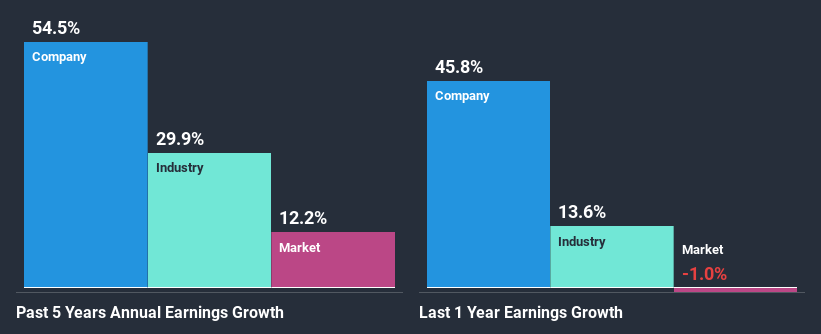Is The Trade Desk, Inc.'s (NASDAQ:TTD) Latest Stock Performance A Reflection Of Its Financial Health?

Most readers would already be aware that Trade Desk's (NASDAQ:TTD) stock increased significantly by 57% over the past three months. Given that the market rewards strong financials in the long-term, we wonder if that is the case in this instance. Specifically, we decided to study Trade Desk's ROE in this article.
Return on Equity or ROE is a test of how effectively a company is growing its value and managing investors’ money. In simpler terms, it measures the profitability of a company in relation to shareholder's equity.
See our latest analysis for Trade Desk
How To Calculate Return On Equity?
The formula for return on equity is:
Return on Equity = Net Profit (from continuing operations) ÷ Shareholders' Equity
So, based on the above formula, the ROE for Trade Desk is:
17% = US$141m ÷ US$833m (Based on the trailing twelve months to September 2020).
The 'return' refers to a company's earnings over the last year. So, this means that for every $1 of its shareholder's investments, the company generates a profit of $0.17.
What Is The Relationship Between ROE And Earnings Growth?
Thus far, we have learned that ROE measures how efficiently a company is generating its profits. Depending on how much of these profits the company reinvests or "retains", and how effectively it does so, we are then able to assess a company’s earnings growth potential. Assuming everything else remains unchanged, the higher the ROE and profit retention, the higher the growth rate of a company compared to companies that don't necessarily bear these characteristics.
A Side By Side comparison of Trade Desk's Earnings Growth And 17% ROE
To begin with, Trade Desk seems to have a respectable ROE. Further, the company's ROE compares quite favorably to the industry average of 13%. Probably as a result of this, Trade Desk was able to see an impressive net income growth of 54% over the last five years. We reckon that there could also be other factors at play here. Such as - high earnings retention or an efficient management in place.
We then compared Trade Desk's net income growth with the industry and we're pleased to see that the company's growth figure is higher when compared with the industry which has a growth rate of 30% in the same period.
Earnings growth is an important metric to consider when valuing a stock. It’s important for an investor to know whether the market has priced in the company's expected earnings growth (or decline). Doing so will help them establish if the stock's future looks promising or ominous. If you're wondering about Trade Desk's's valuation, check out this gauge of its price-to-earnings ratio, as compared to its industry.
Is Trade Desk Using Its Retained Earnings Effectively?
Summary
On the whole, we feel that Trade Desk's performance has been quite good. Specifically, we like that the company is reinvesting a huge chunk of its profits at a high rate of return. This of course has caused the company to see substantial growth in its earnings. With that said, the latest industry analyst forecasts reveal that the company's earnings growth is expected to slow down. Are these analysts expectations based on the broad expectations for the industry, or on the company's fundamentals? Click here to be taken to our analyst's forecasts page for the company.
This article by Simply Wall St is general in nature. It does not constitute a recommendation to buy or sell any stock, and does not take account of your objectives, or your financial situation. We aim to bring you long-term focused analysis driven by fundamental data. Note that our analysis may not factor in the latest price-sensitive company announcements or qualitative material. Simply Wall St has no position in any stocks mentioned.
Have feedback on this article? Concerned about the content? Get in touch with us directly. Alternatively, email editorial-team@simplywallst.com.

